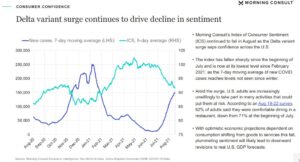The following article by Ruy Teixeira, author of The Optimistic Leftist and other works of political analysis, is cross-posted from his blog:
Here are some interesting new data from the University of Maryland’s Program for Public Consultation gauging the popularity of 28 different aspects on the proposed reconciliation budget. All are at least somewhat popular but some are a lot more popular than others. Not all will make it into the final bill of course. Time to make a deal based on some combination of popularity and importance. And that will involve some tough choices. From Politico Playbook:
“They started off with a jaw-dropping $6 trillion price tag, then lowered it to $3.5 trillion.
Now, there’s reporting suggesting Sen. JOE MANCHIN wants the total for Democrats’ reconciliation plan to drop as low as $1 trillion or $1.5 trillion (though some people close to him say his comfort zone is probably closer to $2 trillion).
So what exactly will Democrats’ topline number be?
Senate Majority Leader CHUCK SCHUMER and Speaker NANCY PELOSI are both proceeding as if $3.5 trillion is the magic number, at least for now. Then there’s Sen. BERNIE SANDERS (I-Vt.), who says progressives have given enough ground already: “That $3.5 trillion is already the result of a major, major compromise,”
But talk to senior Democratic congressional aides and you get a more realpolitik answer — one that’s closer to Manchin than Sanders. Some predict the bill will end up at about $2 trillion, which is significantly less than even President JOE BIDEN wants.
If those aides are right — and there’s reason to think they might be, given how much leverage Manchin has — that means a whole host of items on the party’s wish list will have to be scaled back dramatically or dropped.
The posturing over the price tag is a reminder of how much work the party has to do as it seeks to craft their behemoth bill by the end of September. The process will kick off in earnest today as the House Ways and Means and Education and Labor committees begin marking up their proposals.
Already, there are tensions over the issues being voted on in committee today. For example, we’re told the $762 billion envisioned for education — which includes more than $450 billion for child care and universal pre-K, and hundreds of billions more for school infrastructure and free community college — won’t likely make it to the White House intact. (Our higher ed reporter Michael Stratford has more on Education and Labor Chair BOBBY SCOTT’s bill.)
Likewise, a battle for limited resources is driving the fight over which health care proposals to include, pitting the House against the Senate and White House. (Read Heather Caygle and Alice Miranda Ollstein here for the latest.)
Of course, the dollar total will be dictated by how much Democrats can generate with tax hikes and other revenue raisers — a huge area of contention itself. Democrats could find themselves with between $1 trillion and $2 trillion in revenue depending on how much they scale back the Trump tax cuts. They’ll also net a large chunk of change from the prescription drug overhaul, though they’re sparring over details of that plan as well.
After that, the real fight will commence: How to spend the money . Pelosi acknowledged the coming battles over limited dollars: “Where would you cut? Child care? Family medical leave paid for? Universal pre-K? Home health care?”
As two senior Democratic sources put it to us recently, the more Manchin talks, the better. Right now, most negotiations are taking place between House and Senate leadership and the White House. But the real veto power lies with Manchin and Sen. KYRSTEN SINEMA (D-Ariz.). So the more they communicate about what they will or won’t accept, the better, per these aides: It will force Democrats to come to grips with reality of having too few dollars to do what they want — and start having the tough conversations they’ve only begun to broach.”
Trying to think this through in a productive manner would be more useful than incessant denunciations of Joe Manchin, over whom the left has zero leverage. $3.5 trillion is a pipe dream. Time to get real.









